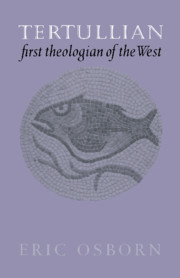Book contents
- Frontmatter
- Contents
- Preface
- Note on the text and list of abbreviations
- 1 Simplicity and perfection
- 2 The puzzle: Athens and Jerusalem
- 3 The paradox: credible because inept
- 4 Strife of opposites and faith as recognition
- 5 Antithesis in one God: ‘Against Marcion’
- 6 Trinity and christology
- 7 Prayer and the bible
- 8 Mankind's two natures and a sordid church
- 9 Argument and humour: Hermogenes and the Valentinians
- 10 Promise of laughter, judgement of hell: apocalyse and system
- 11 Ethics of conflict
- Conclusion
- Select bibliography
- Subject index
- Citations from Tertullian
- Citations from the Bible
5 - Antithesis in one God: ‘Against Marcion’
Published online by Cambridge University Press: 09 November 2009
- Frontmatter
- Contents
- Preface
- Note on the text and list of abbreviations
- 1 Simplicity and perfection
- 2 The puzzle: Athens and Jerusalem
- 3 The paradox: credible because inept
- 4 Strife of opposites and faith as recognition
- 5 Antithesis in one God: ‘Against Marcion’
- 6 Trinity and christology
- 7 Prayer and the bible
- 8 Mankind's two natures and a sordid church
- 9 Argument and humour: Hermogenes and the Valentinians
- 10 Promise of laughter, judgement of hell: apocalyse and system
- 11 Ethics of conflict
- Conclusion
- Select bibliography
- Subject index
- Citations from Tertullian
- Citations from the Bible
Summary
There were several reasons for the length and care of Tertullian's reply to Marcion. Dualism was the foremost threat to emerging Christian theology. Marcion gave a negative answer to the first question of that theology: ‘Is there one God good and true who is creator of this world of evil and chaos?’ Since Marcion produced the strongest case against one God, and supported his argument from scripture, his work required careful discussion. Deeper still, Marcion's denial went to the central contention of the common response. He denied the economy of salvation, centred on Christ, which was the theme of the early Christian answer. For Marcion, God's total disgrace could not be the sacrament of man's salvation.
Paradox was unacceptable to Marcion because it contradicted the primary pledge to simplicity which Marcion and Tertullian shared. In God there could be no change nor shadow cast by turning. All that contradicted perfect love must be denied. In this Marcion followed a common view of God. For Plato, the form of the good was above all contradiction; dialectic was the way to reach the summit where all conflict ceases and there is an everlasting loveliness that neither flowers nor fades. For Aristotle, the first cause of all, like a magnet in an armchair, needed to do nothing. For the Epicureans, the chief attribute of gods was their remoteness and their lack of involvement in human affairs.
- Type
- Chapter
- Information
- Tertullian, First Theologian of the West , pp. 88 - 115Publisher: Cambridge University PressPrint publication year: 1997



